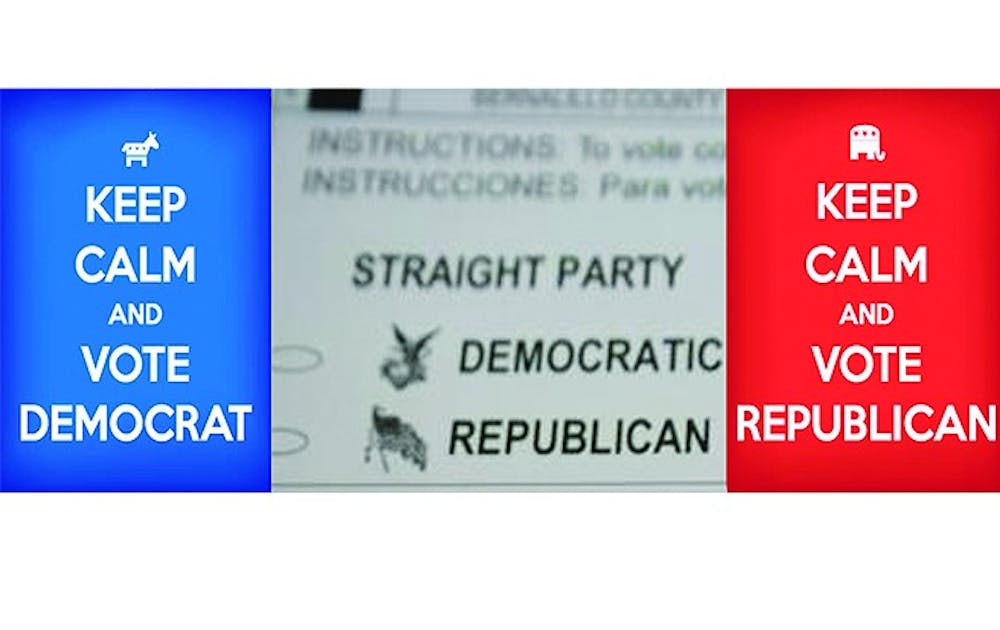Straight ticket voting may exacerbate uninformed voting.
The voting system, established in North Carolina since 2000, allows individuals to vote for a single party across all races by marking a single bubble. Although straight ticket voting expedites the voting process for voters, especially those who have strong party affiliations, some question whether the system encourages voters to cast ballots without being fully educated about the candidates.
“Straight ticket voting enables those that are less informed about individual candidates and individual political contests to vote and to have blind faith that everyone on their selected side is better than everyone on the other side,” said state Sen. David Lewis, R-Harnett.
North Carolina is one of 15 states with straight ticket voting and the only state where the option does not include the presidential race or nonpartisan judicial races.
The exclusion of these races has caused significant voter confusion since its inception in 2000 and has contributed to a phenomenon called “undervoting,” when a voter does not complete the ballot, Lewis said. Undervoting most often occurs when voters opt into straight ticket voting, unaware that the presidential and judicial races are not included.
“People assume they’ve exercised their right to vote, but they haven’t,” he said.
In 2004, more than 92,000 North Carolina voters failed to vote in the presidential race, according to the North Carolina Coalition for Verified Voting. That year, 2.57 percent of the nearly 3.96 million casted ballots were incomplete. These numbers mark an increase in presidential race undervoting since 2000, when more than 75,000 voters neglected to vote for a candidate. Overall, the undervote in 2000 stood at 3.15 percent of ballots.
Straight ticket voting also has significant implications for judicial races, Lewis added. Confusion about whether straight ticket voting applies to these races, in conjunction with the fact that voters tend to be less educated about judicial candidates, causes a significant voter drop-off in those races.
Demystifying confusion about the voting procedure is a priority, said Tori Bragg, director of North Carolina Young Americans for Romney. The campaign actively informs voters about the system during all of their events and campaigning efforts. Popularity for straight voting across the nation has waned over the past decade. Starting with Georgia in 1994, six states have abolished the option—Wisconsin being the most recent one in 2011.
Legislators in New Hampshire eliminated straight ticket voting in 2007 after determining that voters should read through the ballot and make their choices independent of party affiliations, said David Scanlan, deputy secretary of state of New Hampshire. He noted that public reaction toward the abolition remained relatively ambivalent, though voters with strong partisan affiliations preferred the old system.
David Rohde, Ernestine Friedl professor of political science, noted that Republicans tend to disfavor straight ticket voting. When they control state legislatures, the state has been more likely abolish straight ticket voting.
But Democrats generally favor straight ticket voting more because it has historically benefited their party, Rohde said. Historically, Democratic voters have been less likely to be informed about individual candidates and would be more likely to vote for only candidates of their party.
Students have also raised ethical concerns about straight ticket voting. Sophomore Eeshan Bhatt said he opposes straight ballots because it further polarizes government politics. Bhatt did not vote straight ticket.
“If you’re going to vote for someone, you should take the time to fill in all the bubbles,” Bhatt said. “Straight ticket voting encourages people to vote without being fully educated.”
Although sophomore Jackie Dobbies is also concerned about uninformed voting, she does not think it should be abolished. Straight ticket voting saves time and therefore attracts voters who may otherwise be deterred, she said.
Straight ticket voting will likely be addressed in the General Assembly, though whether the state will continue providing the option remains uncertain, Lewis said. He added that representatives from both sides of the aisle have expressed interest in abolishing the system.
“Members on both sides tend to think that straight ticket voting tends to help the other side more than it helps their side,” Lewis said.
Although Lewis said he is uncertain whether straight ticket voting disproportionately benefits one party over another, Democrats have more effectively organized their party base to not just vote but to support the whole party by voting straight ballot. He added that such activism does not mean straight ticket voting provides a partisan advantage—Republicans have the same opportunity to rally their base.
Get The Chronicle straight to your inbox
Signup for our weekly newsletter. Cancel at any time.

